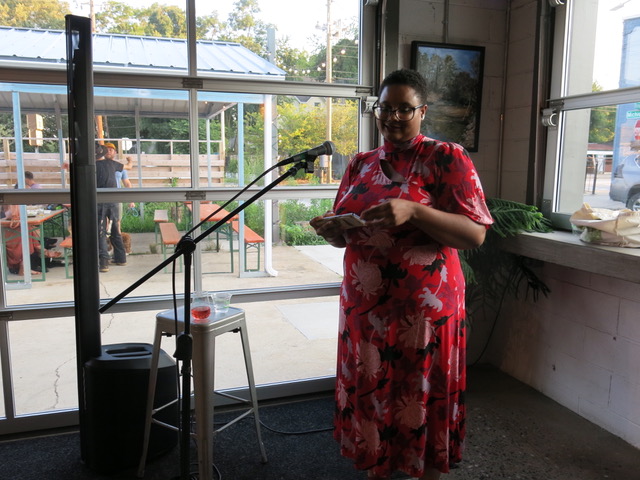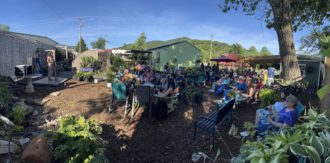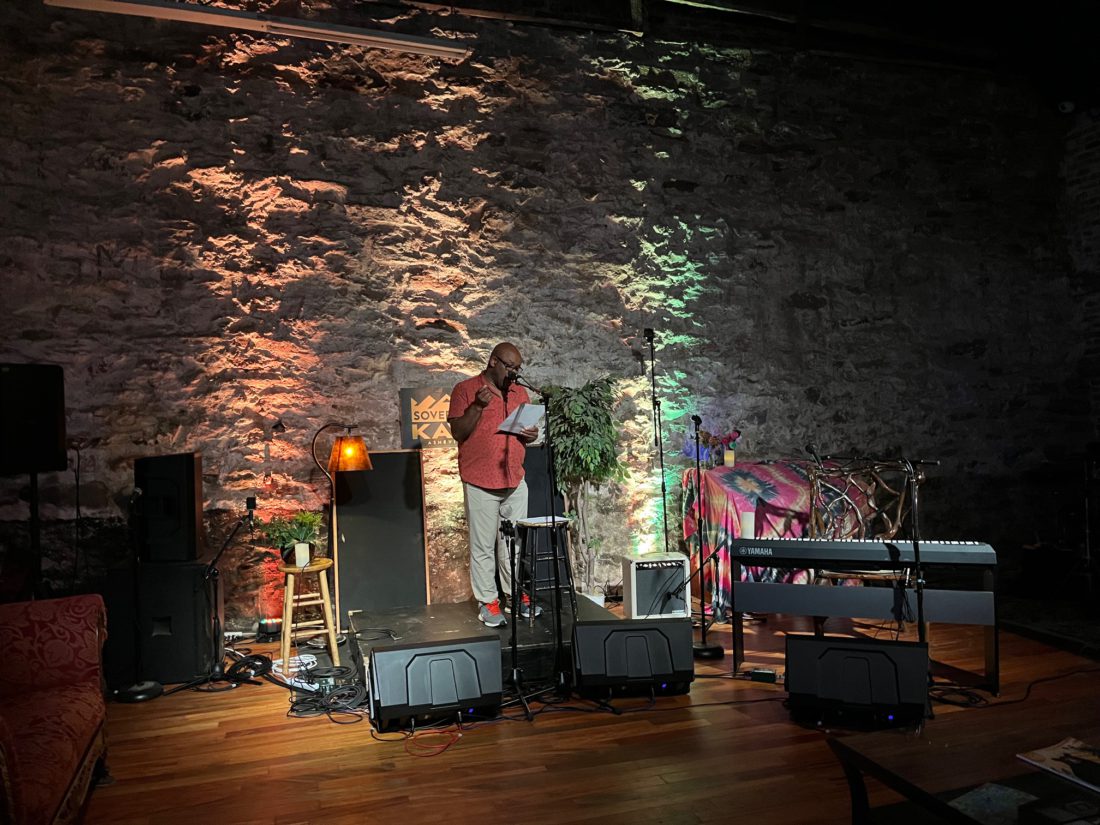Timing is everything, as the saying goes, and Caleb Beissert can speak to the veracity of those words more than most people.
In 2010, he’d recently graduated from Western Carolina University, moved to Asheville and was looking for places to read poetry and meet other poets. In the pages of this very newspaper, he saw that Sovereign Kava was hosting an open mic.
“I went down there and asked about the event, and they said, unfortunately, it had been canceled that night,” Beissert recalls. The venue, he notes, was having issues keeping a regular host. And while Beissert had no experience leading an open mic, something compelled him to offer his services. To his surprise, the bar agreed. “It’s kind of just snowballed from there,” he says.
A dozen years and hundreds of eclectic performances later — “Any kind of weird art, I’ve seen it on the mic,” Beissert says — Poetry Open Mic Asheville is the longest-running open mic in town and, as far as Beissert knows, throughout North Carolina. But while that serendipitous opportunity has worked well for him, more traditional planning has also proved successful in the formation of other area reading series that likewise take place in nontraditional spaces.
Needful things
Clint Bowman identifies poetry as his primary form of artistic expression and believes that being part of a community is vital to any writer’s growth. When he moved to Black Mountain three years ago, he knew he needed to find a group to help him focus on his writing.
“Black Mountain’s history is already rich in poetry, given that the Black Mountain College resided here, so I was surprised to learn that no such group existed,” he says. “After searching around town for a while and not finding anything, I reached out to Melisa Pressley, the branch manager of the Black Mountain public library.”
Pressley, also a writer, similarly recognized the unmet need for such a group in the community. Together, they launched the Dark City Poets Society in January 2020 at the Black Mountain Library, where a critique meeting is held on the first Tuesday of each month. DCPS’s Poetry Night takes place on the third Tuesday of the month, and, after outgrowing its original home at BAD Craft, has expanded to the business’s sister location, The Lowdown at Mellie Mac’s Garden Shack. The group still meets at BAD Craft in the winter and when there’s bad weather.
“Aside from being free and accessible to everyone, our founding goals were essentially created by the poets in the group,” Bowman says. “At the first few meetings, everyone took an interest survey that asked what their goals/interests were for the DCPS. Based on those responses, we decided to focus on sharing/critiquing poems and creating opportunities to share our work with others.”
Rachel Hanson, assistant professor of literature at UNC Asheville, also had community in mind when forming Punch Bucket Lit earlier this year. Though she appreciates the renowned authors the university attracts for its on-campus reading series, Hanson says she sought to establish a monthly literary event in her West Asheville neighborhood that would bring together WNC authors and poets.
“I just wanted something that would be fun that would give local writers an opportunity to read new stuff or try out new work,” she says. “Or maybe just share some of the stuff that they didn’t get a chance to read. A lot of writers had books come out during the pandemic, so they didn’t really get to do a book tour. There’s a lot of reasons to start it and really try to support the literary community in Asheville.”

In search of a nearby spot to host the monthly reading series — the name of which comes from a nickname for her cat, Punchy Eloise — Hanson pitched her idea to Harrison Fahrer, Cellarest Beer Project’s co-founder and general manager. Noting to Fahrer that the event would ideally feature one poet and one prose writer, Hanson quickly found an enthusiastic ally.
As a musician and a photographer, Fahrer says he’s worked to have Cellarest be “a tiny mecca for the arts in West Asheville.” Within its first year, he notes, the brewery commissioned an outdoor naturescape mural by Ricardo Tejeda and Gus Cutty, began regularly featuring local artists’ works inside and started hosting live music events. But sitting down with Hanson to hear her vision for a reading series proved revelatory.
“I felt like she was bringing the missing piece to our space,” Fahrer says. “Since its inception [in March], I’ve personally found Punch Bucket Lit to be one of the most consistently therapeutic and empathetic experiences that we host at Cellarest. More often than not, you’ll find the words you didn’t know you were looking for to describe an experience and feelings of your own.”
Fahrer has Punch Bucket Lit readings booked through June 2023 and has also scheduled several bonus pop-up events to keep up with the growing popularity. “All in all, we’re grateful and nourished on quality literature and lagers over here,” he says.
We’re meeting where?
For each reading series, the unorthodox location has been key to developing a welcoming, inclusive environment. Sovereign Kava, for example, doesn’t sell alcohol, and its on-site absence grants the space a different vibe than a traditional bar.
“It’s a lot more chill,” Beissert says. “I’m not saying there’s nobody on alcohol there, but I think overall it kind of gives this vibe where it’s more conducive to creating a listening room and a space where people are focused and they have meaningful conversations that they actually remember the next day.”
That atmosphere has made Poetry Open Mic Asheville increasingly popular, to the point that performers — including poets, musicians, dancers, magicians and more — now have to show up prior to 8 p.m. each Wednesday and wait in line to secure a spot. Beissert opens each event at 8:30 p.m. with a set of his own poetry, then cedes the stage to a series of five- to 10-minute spots. Each event runs until at least midnight, sometimes 1 a.m., fitting in 20-30 performers — all without breaks.
“It always amazes me that people show up and stay all night, including people who come just to watch and not even perform,” he says. “The level of dedication of the performers raises the bar for everyone. You end up getting really quality work out of people, and that makes for a good show for everyone, not just the one person onstage.”
When Bowman and Pressley looked for a host for DCPS’ Poetry Night, BAD Craft was their first choice due to its reputation as a central gathering point for artists in Black Mountain. The business’s selection of beers on tap and in cans also resulted in a portion of drink sales being donated to the library, and that partnership has continued at Poetry Night’s new home.

“With The Lowdown being located within an outdoor plant/gardening store, this new location creates a very welcoming and inspiring environment for all in attendance,” Bowman says. “Also, there’s booze, and a little liquid courage is often useful when it comes to vulnerably sharing your poems.”
The sign-up sheet is set out around 5:45 p.m., and the events typically begin right at 6 p.m., with Bowman reading a few poems and going over the guidelines for the event. Everyone who signs up gets three to five minutes to read or recite their poetry. Once all interested parties have participated, they take a 10-minute break, and then writers are invited to give a second reading. The formula has been successful, which Bowman attributes to Poetry Night being less of a performance and more of a way for the community to come together and support one another.
“Our group has steadily grown, and we have witnessed genuine friendships result from it,” Bowman says. “We have also witnessed increased confidence among participants who now feel led to take on more facilitator-type roles. Over the past 2 ½ years, my volunteer role as the primary facilitator has helped me tremendously in my own writing as well. Our poets are pushing boundaries, growing as writers and making crucial connections in this community.”
The newest of the three series, Punch Bucket Lit events begin at 6:30 p.m., with a half-hour of mingling. Thirsty attendees can choose from alcoholic and nonalcoholic options, and, at 7 p.m., Hanson introduces the series and the writers, who get 20-25 minutes apiece with a 10-minute break between sets. Afterward, the bulk of attendees continue to hang out and talk with one another, forming bonds that might not occur in more formal settings.
“I love readings at bookstores. I love readings at the university. I love them at art museums,” Hanson says. “But this is more casual and really focused on the writing and the work and people supporting each other. It’s superbeautiful.”






Before you comment
The comments section is here to provide a platform for civil dialogue on the issues we face together as a local community. Xpress is committed to offering this platform for all voices, but when the tone of the discussion gets nasty or strays off topic, we believe many people choose not to participate. Xpress editors are determined to moderate comments to ensure a constructive interchange is maintained. All comments judged not to be in keeping with the spirit of civil discourse will be removed and repeat violators will be banned. See here for our terms of service. Thank you for being part of this effort to promote respectful discussion.